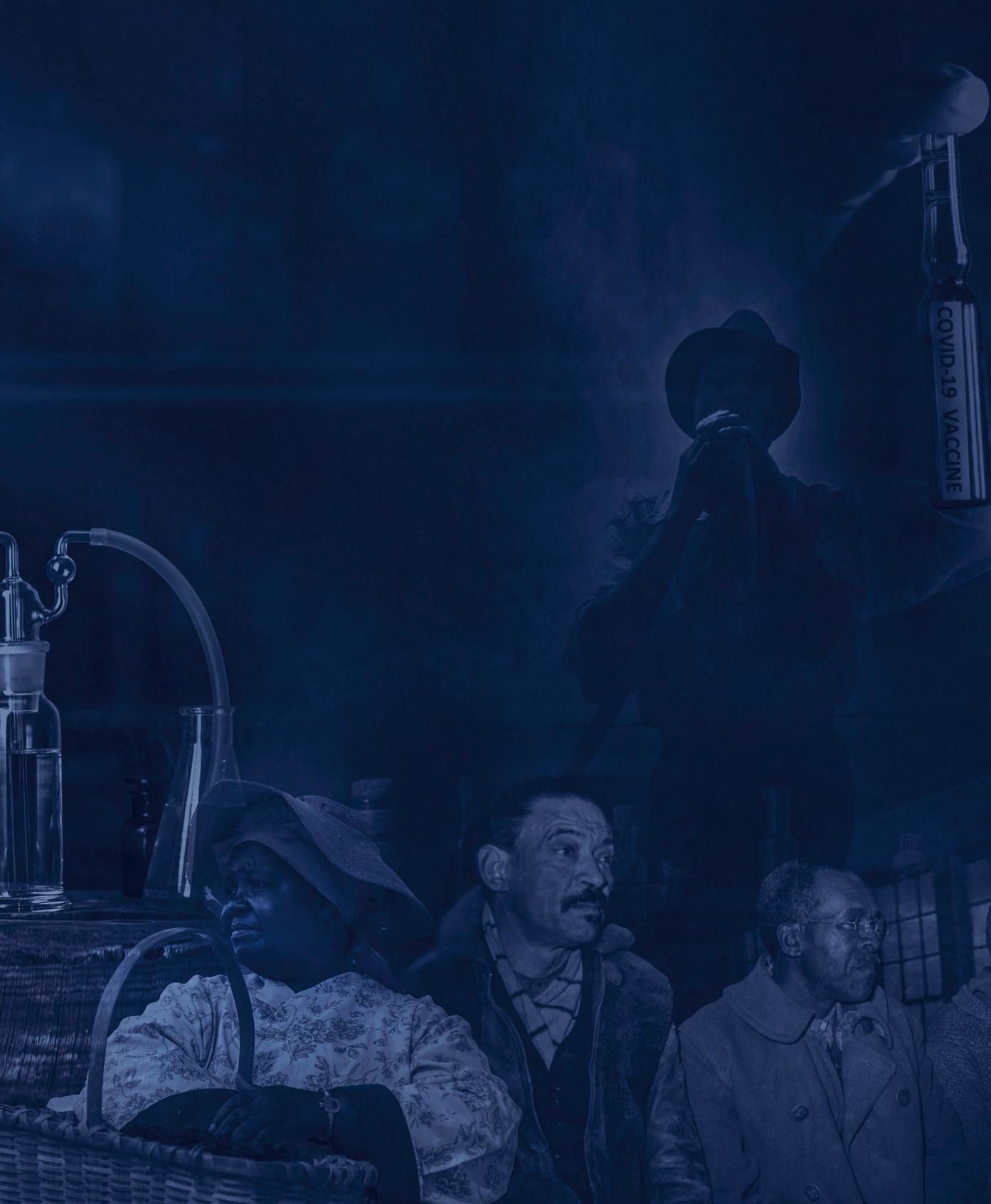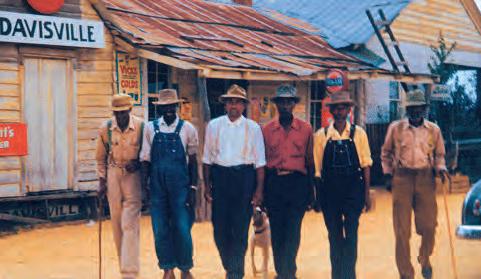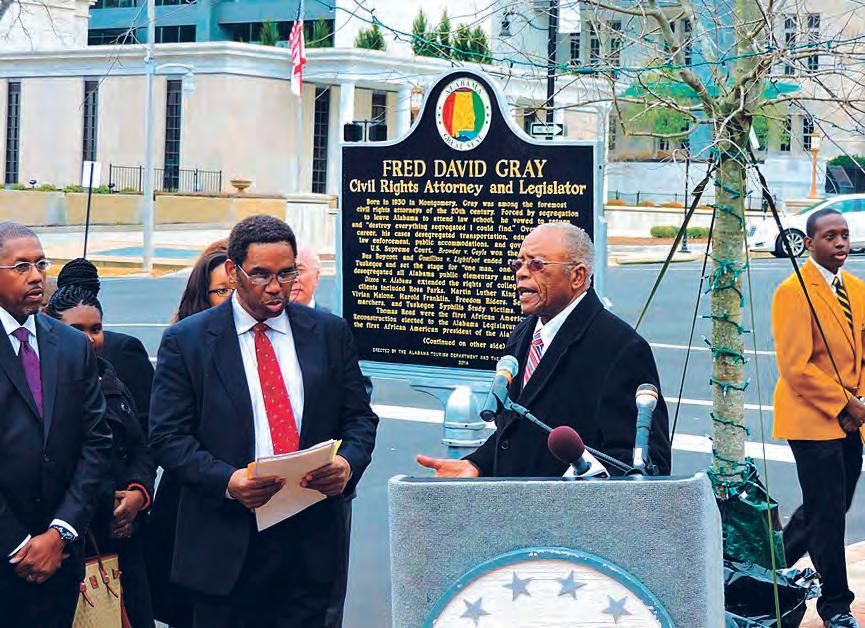
12 minute read
Breaking the Chains of MisTRUST
Why the troubled legacy of betrayal between Blacks and the medical science community still haunts us today
By Tim Turner
Advertisement
Fred Gray Jr. has been excited about the availability
of COVID-19 vaccines. He recently returned from a California business trip where he saw people paying others to stand in line for them for vaccinations. And he was thrilled when he saw license plates from neighboring states in a Montgomery, Ala., CVS parking lot, a sign he said that there was plenty of vaccines for people like one of his African American clients.
Gray said the client had not been vaccinated nor had she scheduled an appointment. When he asked her why, he was floored by her response.
“She said she heard it turned you into a zombie,” Gray, a Montgomery attorney, recalled.
“I told her that wasn’t true, but she said, ‘It doesn’t happen right away, but you do.’”
Gray sighed: “The things people believe.”
Despite the best efforts of scientists and healthcare professionals of color to promote the efficacy and benefits of getting vaccinated, the legacy of American medical malfeasance toward Blacks continues. The numbers bear that out.
As of mid-August 2021, the Centers for Disease Control and Prevention (CDC) reported that just 10 percent of Blacks had received at least one dose of a COVID-19 vaccine. For Hispanics, the number is 17 percent and for Asians, just 6 percent. For other minorities, the rate is 1 percent or less. Though recent indications show a narrowing of vaccination rates, those numbers still lag far behind those of whites, which is 58 percent.
For African Americans, the mistrust of the American medical community is rooted in large part to the mistreatment of Black men in a small town in Alabama. Gray said he’s heard it time and time again.
“Can you say, ‘Tuskegee Syphilis Study’?” Gray said in reference to a recent call he had with friends discussing the vaccine. “I related to [the friend] that the facts about Tuskegee and the COVID-19 vaccination are totally different, and she asked me where I got my information from.”
Gray, 60, got his information at home, from his father, Fred Gray Sr., now 90. Gray Sr. was the attorney who represented the Black men in the Tuskegee Syphilis Study. Today, both he and his father are vaccinated against COVID-19.
“African Americans may very well have some mistrust of the government based on some prior concurrence,” Gray Jr. said. “But the Tuskegee experiments should not be a reason for people of color to not get vaccinated. Really, when you look at it, you’re looking at two key events that are just not similar in almost any respects.”
Historical Perspective Funded by the United States Public Health Service (USPHS), the 1932 study’s objective was to record the natural course of syphilis in Black men. The USPHS went to Macon County, Ala., Tuskegee’s county seat, to conduct the study. There, 600 Black men — 399 with syphilis, 201 without — agreed to be treated over a publicly stated six-month period. In return, the men were offered free medical exams, free meals, and burial insurance.
Researchers had numerous opportunities to end the study but didn’t — including in 1945 when penicillin was accepted as a treatment for syphilis. The participants were not treated at all, and the ostensibly half a year of research continued until 1972, a total of 40 years.
The disregard for the participants’ lives has been something African Americans still have difficulty getting past. So today’s vaccines, hastened in development by what President Donald Trump called Operation Warp Speed, still must fight their way out of (continued on next page)
The Building of Medical Mistrust
Four hundred years later some people question what has changed.
Africans were enslaved and transported to the American colonies to be treated as property, receiving little to no medical treatment.
1932

The U.S. Public Health Service started a 40-year experiment with 600 poor, Black sharecroppers enrolled in the Tuskegee Study of Untreated Syphilis in the Negro Male. Participants were told they were getting free medical care from the federal government. Unaware they had syphilis, government doctors studied the disease and the effects it had on the participants. Even when treatment for syphilis became available, the men were not treated.
April 10, 1945
Ebb Cade, an African American male, was the first test subject in the human radiation experiment (i.e., Manhattan Project) in Oak Ridge, Tenn. He got in a car accident on March 24, 1945, and fractured bones in his arms and legs. While waiting for treatment on April 10, he received injections of 5 mg of plutonium without his consent. Cade did not receive any treatment for his bone fractures until April 15. Fifteen of his teeth were extracted to see the results of the radiation. Cade died 8 years later from heart failure. Surgeon James Marion Sim, widely considered the “father of modern gynecology” for developing surgical techniques that help women through a difficult childbirth. Sims created his techniques by operating on enslaved Black women without using anesthesia.
Oct. 4, 1951
Henrietta Lacks, a 31-year-old African American mother of five from Virginia, died of cervical cancer. Medical researchers use her cancer cells, known as the HeLa cell line. Lacks’ cells are one of the most vital cell lines in medical research. It has been used to study the effects of toxins, drugs, hormones, and viruses on the growth of cancer cells without experimenting on humans. The HeLa cells were used to develop the polio vaccine and in cancer and AIDS research. Doctors never got Lacks or her family’s permission to culture her cells.

(Above) Group of men who were test subjects in the Tuskegee Syphilis Experiments (before 1972).
© Department of Health, Education, and Welfare. Public Health Service. Health Services and Mental Health Administration. Center for Disease Control. Venereal Disease Branch (1970–1973), Wikimedia Commons, CC-BY-SA-3.0. (Bottom) Herman Shaw (R) speaks as U.S. President Bill Clinton looks on during ceremonies at the White House in Washington in which Clinton apologized to the survivors and families of the victims of the Tuskegee Syphilis Study. Shaw and nearly 400 other Black men were part of a government study that followed the progress of syphilis and were told that they were being treated, but were actually given only a placebo. (Paul J. Richards/AFP via Getty Images)

During the Civil War, there were separate wards for wounded Black soldiers in the Union Army; they were poorly staffed. Black soldiers died from wounds that white soldiers would recover from due to a lack of supplies and treatment. Blacks continued to be used in medical experiments without consent, dead or alive.
April 4, 2016

Half of 222 white medical students and residents surveyed at the University of Virginia believe Blacks and whites are biologically different, according to a paper published in the Proceedings of the National Academy of Sciences. They also believe Blacks felt less pain than whites and thus were more likely to suggest inappropriate medical treatment for Black patients. This is believed to be the first study linking racial bias to biology, racial perception of pain, and the accuracy of medical advice. Sterilization laws were centered towards people with mental illnesses in their beginning stages, but expanded to a list of different medical conditions and extreme circumstances that gave doctors leeway in choosing who to sterilize. These laws drastically affected African Americans who were four times more likely to be sterilized than their white counterparts.
2021
Bones from the remains of a young Black victim from the 1985 MOVE bombing in Philadelphia were kept by anthropologists and used for instruction and featured in a video taught by a University of Pennsylvania professor and offered by Princeton for an online course.
the shadow of Tuskegee’s 40-year deception in which Black bodies were devalued in the name of medical science.
Reuben Warren, Ph.D., is the director of the National Center for Bioethics in Research and Health Care at Tuskegee University. The bioethics center was established in restitution for the government’s role in the study. During a 1997 press conference, President Bill Clinton invited the survivors of the study to the White House to give a formal and rare apology on behalf of the federal government. He vowed to provide federal funding to erect a national bioethics center at Tuskegee University. The center is “devoted to engaging the sciences, humanities, law, and religious faiths in the exploration of the core moral issues which underlie research and medical treatment of African Americans and other underserved people.”
In his apology, President Clinton said the study was “something that was wrong — deeply, profoundly, morally wrong. … To our African American citizens. I am sorry that your federal government orchestrated a study so clearly racist.”
Though an egregious time in recent history, Dr. Warren said the legacy of deception goes back well beyond the syphilis study.
“We have to start with the beginning, particularly for African Americans, and that’s 400-plus years ago, and how Black bodies were never valued as being human,” Dr. Warren said. “They were valued as a part of their ability to work. It was about what you could do.
“There have been consistent insults on Black bodies. You can go from the Middle Passage — where we started — and the whole period of enslavement, Jim Crow, segregation. That whole litany. Not even omitting the eugenics movement that said Black people are less than human. And so, the United States Public Health Service Syphilis Study at Tuskegee was just another instance where Black lives were devalued.”
Part of the Solution Fact: At least two of the scientists who helped develop the Pfizer and Moderna vaccines are Black. Yet that fact has seemingly done relatively little to ease the mistrust among African Americans toward the vaccines.
“I think as a physician and infectious disease physician, and a researcher, I’m always concerned,” said Judith Absalon, M.D., a senior medical director of vaccine clinical research and development at Pfizer.
“I think it’s certainly disappointing that there wasn’t a bigger uptake [in Blacks getting vaccinated], but it’s understandable. And so my perspective is to meet people where they are and try to offer them the information that they need in a way that’s understandable, to hopefully get them to where I think they need to be.”
Jayne Morgan, M.D., is doing just that. As executive director of the COVID Task Force at Piedmont Healthcare, Dr. Morgan’s charge is educating populations about the vaccine and encouraging a more proactive role in developing medicines by way of clinical trial participation. Her objective is to increase awareness around the benefits of vaccines and change the narrative from Tuskegee. (Read how MSM is tracking vaccine hesitancy in communities of color in the next article, “Protecting the Vulnerable.”)
“I would just say we haven’t replaced [the Tuskegee narrative] with anything new,” Dr. Morgan said. “So, of course, [Tuskegee] will be a thing.


(clockwise) Attorney Fred Gray honored with historic marker in 2015 in Montgomery, Ala., © Gwaller87, Wikimedia Commons, CC-BY-SA-3.0; Dr. Jayne Morgan, executive director of COVID Task Force at Piedmont Healthcare; Dr. Judith Absalon, senior medical director, vaccine clinical research and development at Pfizer
For that reason, Dr. Morgan was not surprised that African Americans, in particular, were hesitant to get vaccinated, especially in light of the speed with which the vaccines were developed.
“I knew we [Blacks] were not going to take [the vaccine],” she said. “I saw that train coming 10 miles down the road. And, you know, it’s unfortunate that the Trump administration, but certainly in keeping with their mantra, made no effort at communication or education or disseminating information ahead of the rollout of this vaccine. So, when the vaccine rolled down, what happened was people crossed their arms and said, ‘Oh, no. We don’t know what this is.’”
Dr. Absalon of Pfizer agrees, adding: “It’s not just Tuskegee, right? It’s not just Henrietta Lacks. It’s literally every day that we interface with certain systems that people have a reason to be hesitant, you know. And all the other stuff that happened last year with our government and the community of the purposeful miscommunication didn’t help, right? So, none of this is surprising.”
Which is an unfortunate reality for underserved populations. That fear and uneven access have contributed significantly to death rates higher than other groups. However, Dr. Absalon is convinced that once people of color wrap their minds around its benefits, cases will plummet, and communities will get better.
“I’m a proponent of vaccines, in general,” Dr. Absalon said. “My background is infectious diseases. I’m also a first-generation immigrant from a poor family, from a poor country [Haiti]. And so, I see firsthand the devastation of not having access to that. I know of what vaccines can do from direct experience.
“I have always been an advocate of vaccines because it’s probably the cheapest thing that we can do to save millions upon millions of lives. We all very easily take medications. I had a headache all day, so I’m popping in my Tylenol or my Motrin and not even thinking about it. We can treat millions of people by preventing them from getting sick.”
Education is so critical. Part of that means actively participating in trials during the development of these medicines. Dr. Absalon runs clinical trials and she sees opportunity for people of color to participate and improve the research and not willfully be part of the reason for healthy inequities.
“So the clinical investigators that I work with, one of the things that I’ve been talking about internally is having more diversity in our investigators,” Dr. Absalon said. “Meeting the ones that are at Morehouse [School of Medicine] or Columbia, or Tuskegee who are getting people to participate in those clinical trials, because the participants are going to trust somebody who’s from their community or they know for a very long time. And so, having us participate in clinical trials then allows us to have a voice.” M








